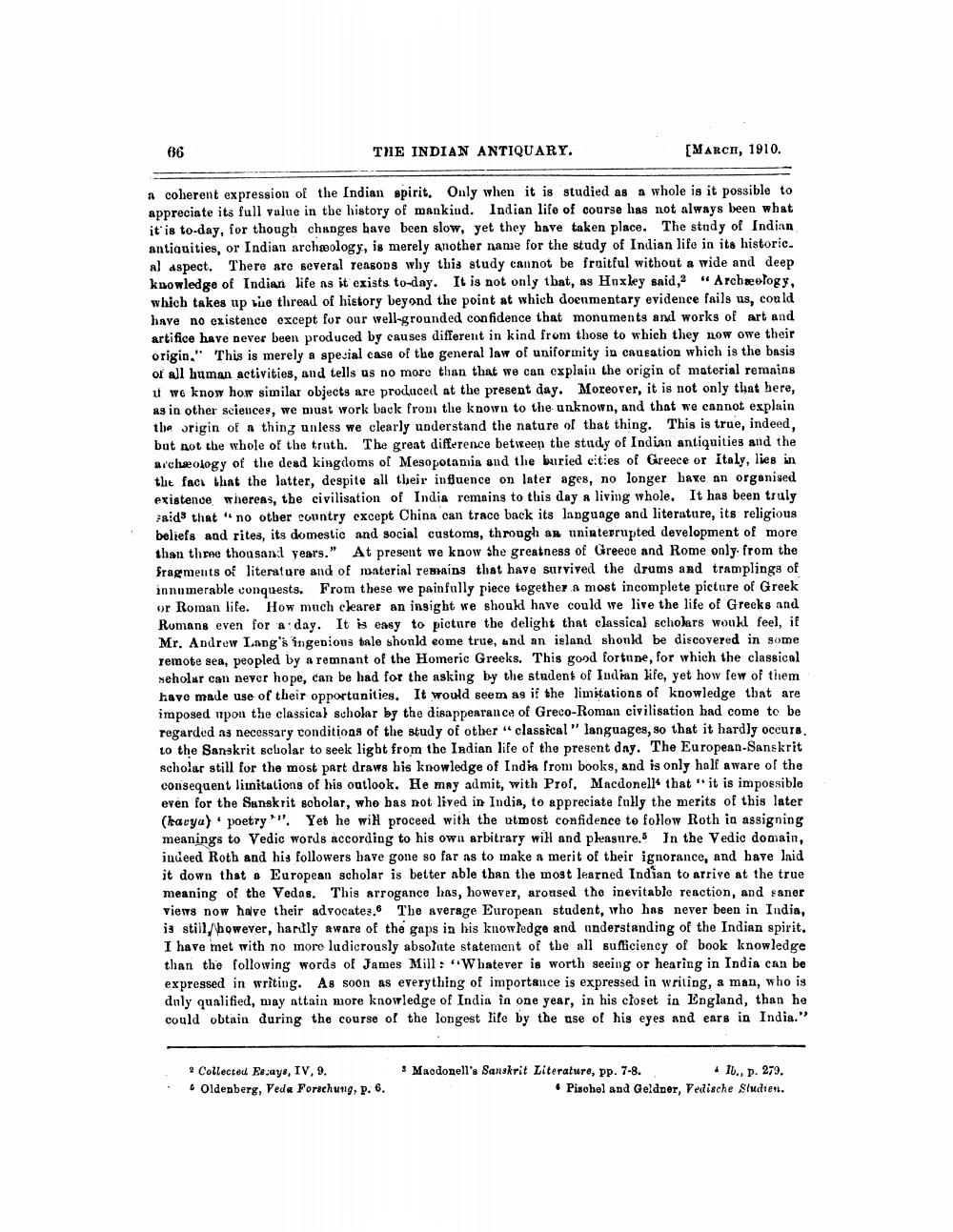________________
66
THE INDIAN ANTIQUARY.
[MARCH, 1910.
a coherent expression of the Indian spirit. Only when it is studied as a whole is it possible to appreciate its full value in the history of mankind. Indian life of course has not always been what it is to-day, for though changes have been slow, yet they have taken place. The study of Indian, antiquities, or Indian archaeology, is merely another name for the study of Indian life in its historic. al aspect. There are several reasons why this study cannot be fruitful without a wide and deep knowledge of Indian life as it exists to-day. It is not only that, as Huxley said, "Archæology, which takes up the thread of history beyond the point at which documentary evidence fails us, could have no existence except for our well-grounded confidence that monuments and works of art and artifice have never been produced by causes different in kind from those to which they now owe their origin." This is merely a special case of the general law of uniformity in causation which is the basis of all human activities, and tells us no more than that we can explain the origin of material remains t we know how similar objects are produced at the present day. Moreover, it is not only that here, as in other sciences, we must work back from the known to the unknown, and that we cannot explain the origin of a thing unless we clearly understand the nature of that thing. This is true, indeed, but not the whole of the truth. The great difference between the study of Indian antiquities and the archaeology of the dead kingdoms of Mesopotamia and the buried cities of Greece or Italy, lies in the fact that the latter, despite all their influence on later ages, no longer have an organised existence whereas, the civilisation of India remains to this day a living whole. It has been truly aid that no other country except China can trace back its language and literature, its religious beliefs and rites, its domestic and social customs, through an uninterrupted development of more than three thousand years." At present we know the greatness of Greece and Rome only from the fragments of literature and of material remains that have survived the drums and tramplings of innumerable conquests. From these we painfully piece together a most incomplete picture of Greek or Roman life. How much clearer an insight we should have could we live the life of Greeks and Romans even for a day. It is easy to picture the delight that classical scholars would feel, if Mr. Andrew Lang's ingenious tale should come true, and an island should be discovered in some remote sea, peopled by a remnant of the Homeric Greeks. This good fortune, for which the classical seholar can never hope, can be had for the asking by the student of Indian life, yet how few of them have made use of their opportunities. It would seem as if the limitations of knowledge that are imposed upon the classical scholar by the disappearance of Greco-Roman civilisation had come to be regarded as necessary conditions of the study of other "classical" languages, so that it hardly occurs. to the Sanskrit scholar to seek light from the Indian life of the present day. The European-Sanskrit scholar still for the most part draws his knowledge of India from books, and is only half aware of the consequent limitations of his outlook. He may admit, with Prof. Macdonells that it is impossible even for the Sanskrit scholar, who has not lived in India, to appreciate fully the merits of this later (karya) poetry". Yet he wiH proceed with the utmost confidence to follow Roth in assigning meanings to Vedic words according to his own arbitrary will and pleasure. In the Vedic domain, indeed Roth and his followers have gone so far as to make a merit of their ignorance, and have laid it down that a European scholar is better able than the most learned Indian to arrive at the true meaning of the Vedas. This arrogance has, however, aroused the inevitable reaction, and saner views now have their advocates. The average European student, who has never been in India, is still, however, hardly aware of the gaps in his knowledge and understanding of the Indian spirit. I have met with no more ludicrously absolute statement of the all sufficiency of book knowledge than the following words of James Mill: "Whatever is worth seeing or hearing in India can be expressed in writing. As soon as everything of importance is expressed in writing, a man, who is duly qualified, may attain more knowledge of India in one year, in his closet in England, than he could obtain during the course of the longest life by the use of his eyes and ears in India."
4
2 Collected Essays, IV, 9. Oldenberg, Veda Forschung, p. 6.
Macdonell's Sanskrit Literature, pp. 7-8. ⚫ Ib., p. 279. Pischel and Geldner, Vedische Studien.




